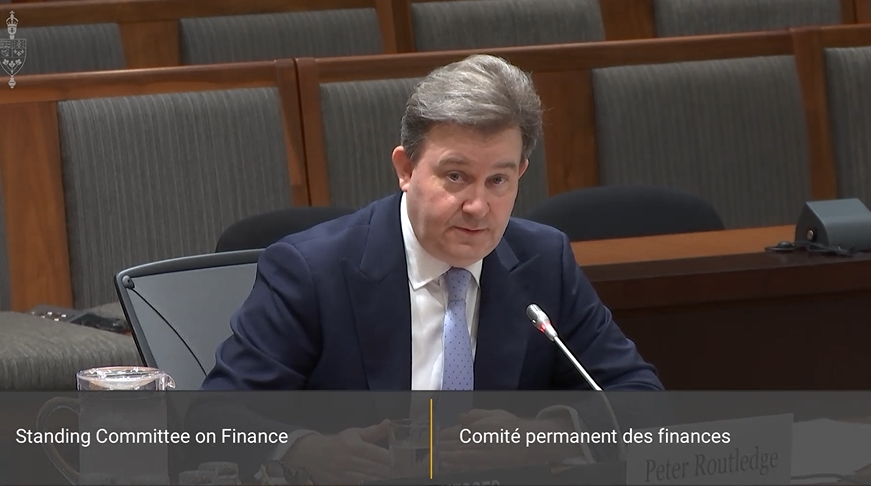The chief of Canada’s Banking Regulator rejected the renewed call to eliminate the stress test for uninsured switch mortgages.
Peter Routledge of the Office of the Superintendent of Financial Institutions, (OSFI), said in testimony to a parliamentary finance committee that the regulator does not plan on changing the stress test of mortgages for non-insured switch mortgages.
Borrowers with mortgages that are default insured (down payment under 20%) do not have to undergo the OSFI stress test if they switch lenders. Those with mortgages that are not insured (downpayments of more than 20%) will have to undergo the OSFI stress test when changing lenders or refinancing.
The minimum qualifying rate (5.25%) or the two-point increase in their contracted interest rate is required. “In today’s environment of high rates, almost all mortgages qualify at the higher rate.”
Adam Chambers, a member of the Finance Committee, asked Routledge whether he felt there was a “disparity” between how insured and non-insured borrowers were treated.
I acknowledge there’s an imbalance based on the experiences of those who don’t have insurance and those that do. We accept the imbalance because it is based on sound underwriting practices,” Routledge stated.
Routledge responded, “Not now, not at all.” When asked by Chambers whether OSFI was considering a review of the requirements for underwriting, Routledge said:
From our point of view, we find the rules – from an underwriting perspective – to be reasonable. “If you are taking on credit risk again, then you have to re-underwrite,” said he. If credit risk remains with the same counterparty, as in the case mortgage insurers I do not think that you should re-underwrite.
Competition Bureau recommends dropping the mortgage stress test
The MP Chambers pointed out that OSFI has rejected the Competition Bureau’s recommendation to drop the stress test for uninsured switches. Comments to CMT In March,
OSFI said at the time that mortgages insured by default insurance posed a smaller risk for financial institutions, since credit risks are assumed not by the lender but rather the insurers.
Routledge responded to Routledge’s question during his appearance before the Finance Committee this week, “Why OSFI is not willing to loosen the reins to help borrowers who face payment shocks at renewal”:
In most cases, “loosening the reigns” will mean lowering or lessening underwriting standards for an individual. It’s true, some people might get a slightly bigger home. You could also stay in the house you have, even though interest rates are making it more expensive. Over time we’d be adding credit risk to the system, which would, according to our judgement, eventually metastasize into an broader financial crisis.
OSFI is concerned with fixed-payment variable rate mortgages
OSFI is a federal agency that has been established to protect and promote the interests of its citizens. made no secret The mortgage lenders it is most worried about are the ones with poor credit ratings fixed-payment variable-rate mortgages. The monthly payment is fixed, even if interest rates change. These products are available from most large banks, except Scotiabank and National Bank.
Routledge stated that he was particularly concerned about those who had mortgages that were negatively amortizing or interest only mortgages.
Routledge said that the number of these households dropped from 270,00 to 175,000 in the last 18 months “as the result of household and financial institutions taking preventive measures,” he stated.
According to the Canadian Bankers Association, he was “pleasantly surprised” by the low rate of delinquency on mortgages, which is just 0.1% of more than 5 million outstanding mortgages.
The arrears rates are well below their peak during the pandemic when they reached 0.27 % in June of 2020. However, it is also higher than the lows of 2022, where the rate was 0.14%.
Routledge stated, “I was pleasantly surprised by the low delinquency rate in Canadian mortgages.” This is primarily due to the six-year mortgage stress test.

